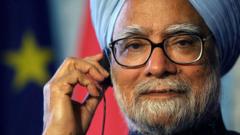The memory of Manmohan Singh endures as a testament to quiet strength and kindness in leadership, navigating challenges from economic reform to national tragedies.**
A Legacy of Kindness and Resolve: Remembering Manmohan Singh**

A Legacy of Kindness and Resolve: Remembering Manmohan Singh**
Reflecting on the life and leadership of India's former Prime Minister, who balanced gentle diplomacy with decisive action.**
Former Indian Prime Minister Manmohan Singh's passing has inspired an outpouring of admiration and reflection on his unique leadership style, often characterized by subtlety and grace. On Saturday, Singh's state funeral will take place, and a seven-day mourning period has been declared by the Indian government. As a prominent figure who shaped modern India, Singh epitomized the concept of a "gentle leader," steering the nation through significant economic transformations while maintaining a personal connection with the public.
Singh's professional trajectory was marked by pivotal roles, including serving as the governor of India's central bank and as finance minister. Yet, he diverged from the flamboyant persona many politicians embrace. Rather, his demeanor was found to be earnest and modest, which both endeared him to the populace and drew skepticism from critics pointing to his softer, quiet approach during scandals and governance challenges.
Admired for his policies that initiated economic reforms, Singh advocated for pro-market strategies that integrated India into the global economy — a legacy that likely substantiates his status as a reformer. His cautious nature and respect for lawful governance earned him admiration, while detractors dismissed his approach as indecisive. Nevertheless, his distinct voice and demeanor resonated with many, providing a refreshing departure from the often bombastic rhetoric prevalent in politics.
Singh's commitment to integrity extended beyond economic growth; his actions reflected a balance of acknowledgment and accountability. Notably, in 2005, he publicly extended an apology for the 1984 riots that devastated the Sikh community, a gesture that garnered wide respect across political lines. Such actions fortified his image as a leader willing to confront the past and foster healing.
During his tenure, Singh navigated various diplomatic challenges, including the 2008 United States-India nuclear deal, which revitalized India's international standing despite domestic opposition and concern over foreign relations. His leadership weathered the global financial crisis, allowing India to emerge with relative stability. A successful re-election in 2009 further cemented his position as a beloved, albeit quiet, figure of benevolence.
However, controversies later emerged, beginning with instances of corruption associated with major events and policies, including the Commonwealth Games and coal field allocations. As public anger surged, especially towards the end of his tenure, Singh found himself under intense scrutiny. The 2011 anti-corruption movement and the government's handling of the gang rape incident in Delhi greatly impacted his reputation, leading many supporters to question his passive approach in the face of growing socio-political challenges.
In 2014, Singh announced he would not seek a third term, citing a belief that history would offer a more favorable assessment of his efforts than contemporary criticisms. Ultimately, the Congress party lost to the BJP, though the narrative of Singh as a kind-hearted yet resolute leader has endured.
Throughout his years in office, Singh maintained a focus on policies that uplifted the middle and lower classes, emphasizing educational advancements, economic stability, and social welfare reforms. His legacy, marked by both triumphs and tribulations, illustrates the complex tapestry of political leadership — one that reflects the enduring qualities of kindness and strength, ensuring his place in India's history as a prime minister who led with heart and determination.




















